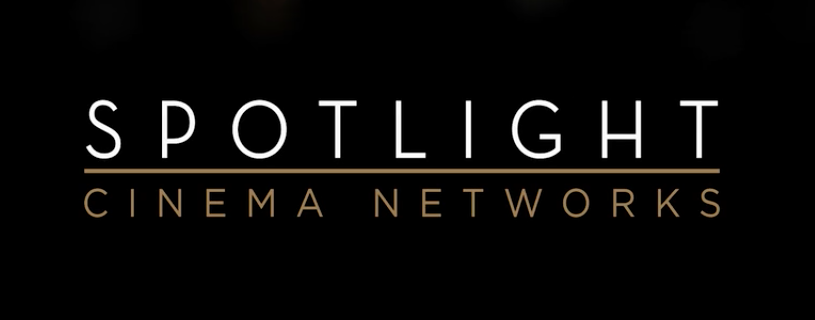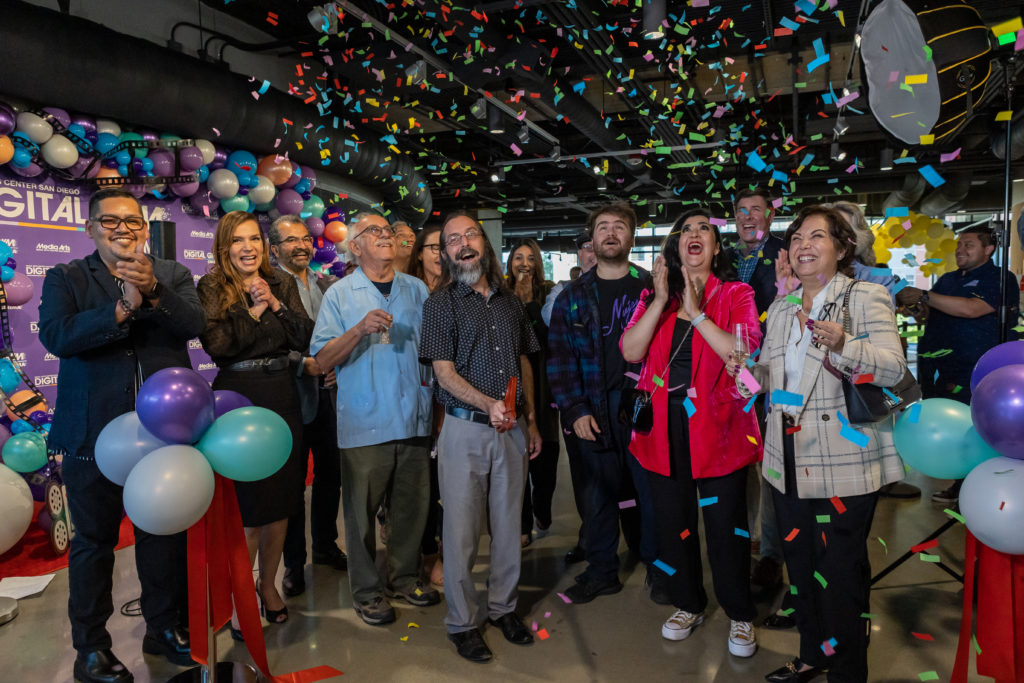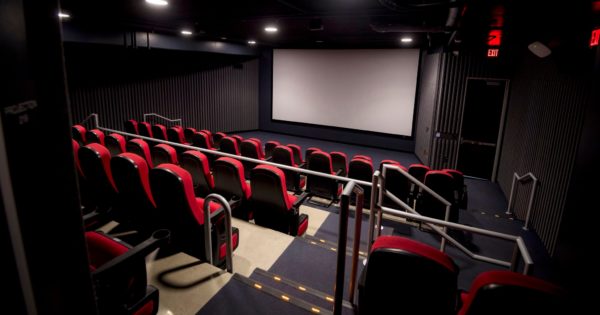As the cinema industry emerges from the Covid-19 pandemic, Boxoffice Pro and Spotlight Cinema Networks are partnering to profile movie theaters and influential industry figures from across the country and ask them to share their first-person accounts of bringing the movies back to the big screen.
Sponsored By:

Digital Gym Cinema
San Diego, California
Interview with Moisés Esparza, Exhibition Manager
What does San Diego’s indie cinema scene look like, and what role does the Digital Gym Cinema play in it?
We’re really lucky that we have a very diverse and multifaceted film scene here. We have major film festivals, like the San Diego Asian Film Festival and the San Diego Latino Film Festival, which we also produce. The [San Diego International] Jewish Film Festival. There are many different types of film festivals in town that allow cinephiles and independent film lovers to be exposed to the very best that world cinema has to offer.
And then we also have some indie cinemas, like La Paloma Theatre, which is a wonderful one-screen cinema in Encinitas, this very beautiful beachside town. There are also some Landmark [Theatres] in town that play independent films. But in the central San Diego area, the Digital Gym Cinema provides weekly access to indie films that wouldn’t be screened in other cinemas around town. That’s our main function, is to be able to give a voice and a platform to filmmakers who have these amazing, exciting propositions that may otherwise not get theatrical play in San Diego.
We’re big believers in watching films communally. I know that the pandemic has pushed us all into our living rooms. The most exciting aspect of reopening is being able to offer this opportunity to watch films as a community. There’s such a special kinship that happens when you’re watching something truly moving on-screen, or something exciting or innovative. And when you see it with an audience, it just enhances that experience.
The type of content that we screen isn’t always linear. Some of them don’t follow traditional plot devices. What I love the most is hearing our audience discuss the film afterwards. I’m not really that interested in whether people like the movies or not, but I am interested in the discussion that comes from innovation in genre modalities or sensibilities. If a film is really confounding, I love the opportunity to hear everyone else’s perspectives on what the meaning of the film is, because it can be so subjective. That not only enhances the viewing experience, but it also enhances my procedure as a programmer when I see that audiences are willing to take a risk on an experimental film or a film a little bit left, left, left of center. It prompts me to look for more films that are in that vein.
Sometimes if there’s a string of films that are maybe just too out there, I scale back and try to book something that’s a little bit more accessible. That public feedback really helps me find that perfect medium between the accessible fare and the more avant-garde films. It humbles me to be able to reopen our cinema in a town that’s already so rich with organizations trying to screen wonderful films from all over the world. I’m humbled to be a part of this amazing community.
Can you walk us through the Digital Gym’s timeline, specifically your recent move and why it took place? What were the challenges of getting a new cinema ready to open during Covid?
We established the Digital Gym Cinema in 2013 in a neighborhood called North Park in San Diego. We took over an old auto parts store and turned it into a movie theater. At the time, it was one-of-a-kind in that neighborhood in particular. We were really instrumental in revitalizing that block of the North Park neighborhood. It took a while to build an audience, because people go to movie theaters they’re used to, or maybe sometimes people don’t want to seek out some of these independent films—until they do, and they become fans of them. So it took a while to get into the swing of things. But once we did, we became a really exciting hub where cinephiles could come visit, week after week, and be exposed to amazing content.
Our lease expired during the pandemic, and we weren’t able to renew it. In August of 2020, we moved out of that North Park location. At the same time, we were developing a relationship with the University of California San Diego, and they were building a new cultural center [the Media Arts Center San Diego] in downtown. They were really excited about the idea of having a cinema be part of this new cultural center. We were able to work it out so that the new Digital Gym Cinema is in this amazing new building called the Park & Market, which is in downtown San Diego. It’s been almost two years since we were last open. We are really excited to be able to screen films once again.
The pandemic also gave my team and me the time to really think about what type of cinema we want to be and what type of programming we want to have. We were able to really think about those questions. Now that we’re reopening, it all seems kind of rushed. But it’s been two years in the making. [The Digital Gym Cinema officially opened in the Media Arts Center San Diego center on May 6, 2022.]

It’s like pushing the reset button, almost.
And in a brand-new neighborhood. We anticipate that it’ll take a while for us to build the type of attendance that we used to have at our former location. Like I said, we’re also very excited by the idea of tapping into new neighborhoods. We are surrounded by residential buildings that are 20 stories high, maybe. I know there are people in these buildings that love watching films, but it’s just going to take a while for us to be able to reach them. It’s an endeavor and a challenge that we’re really excited to undertake.
Our partnership with the University of California San Diego is really valuable, and they’ve been super supportive. Whenever people stop by for tours, they’re like, “Oh, there’s a cinema here!” and I see their eyes light up.They get excited by the idea of a cinema in their neighborhood. I hope that we become a destination for cinephiles in downtown San Diego. It’s all very, very exciting. Definitely a reset. With each email that we send out, with each social media post that we put up, I see responses from individuals who supported us in our former location saying, “I can’t wait for you to open.” When you see advance sales coming in, it’s reassuring to know that you still have a place in the community after a long absence.
That connection with local institutions and communities is so important. The pandemic made it more difficult across the board—and, with Digital Gym, you have the added messaging struggle of reopening in a different neighborhood. How did you approach that challenge?
It’s definitely been a challenge. I think we’re all creatures of habit. We like things to be in exactly the same place that they’ve always been. If anything, the pandemic has taught us all that we have to adapt. And beyond adapting, we also have to support what’s important to us. Independent film is something that we’re really passionate about. The onus is on the audience to seek out that independent theater or that independent content. Otherwise, we won’t be able to serve the community anymore. We’re here to provide the films, but I do think that there are people out there who really want the cinematic experience to continue.
If people really want to preserve the wonderful tradition of going to the movies, they have to go to the movies. That’s the bottom line. We’re there to help them along the way via email, social media posts, advertisements, radio interviews. We’ve been doing our part in getting the word out. Something that I’m looking forward to is reestablishing the wonderful partnerships we had with different film festivals and organizations who hosted their screenings at the [original] Digital Gym Cinema. There’s a group called the Film Geeks here in San Diego, and they program yearly showcases of horror cinema. We also hosted the San Diego Asian Film Festival and the German Film Festival [San Diego]. I want these institutions to know that our venue is available to them to screen their films, because I think the key to longevity is these partnerships with other local institutions and aligning ourselves under a common goal, which is the public exhibition of film.
Programming, whether festival films or everyday screenings, is obviously a huge part of this new incarnation of Digital Gym. As you look to rebuilding your audience, what sort of programming strands are you looking at?
Right now we’re in a very exploratory period in terms of getting reacquainted with the content that’s available to us. I found, especially with the films that we’ve programmed in May—which include [Apichatpong Weerasethakul’s] Memoria, [Hong Sang-soo’s] In Front of Your Face, and Gaspar Noé’s newest, Vortex—a lot of these films are really, really personal and internal. These great big ideas are posed back on the audience—about existentialism, and why we’re here on Earth, and how to make the most out of life.
We’ve all been in the middle of one big existential crisis these last few years.
The filmmakers are posing these questions right back at you. I think a really great way for us to mediate our own struggles with what it means to be alive right now is through art and through seeing other characters, whether fictional or not, go through something similar.
And feeling the energy from other people in the room going through that same thing.
Exactly. That’s why the community aspect is so important. We are going to heal from the chaos of the pandemic. We all have to come together. Art is a perfect way to conceptualize the trauma and hopefully come up with collective strategies to overcome what we’ve all been through.
In terms of the programming, [we’re] trying to listen to what the filmmakers are saying and provide our cinema as a vessel for finding some sort of resolution to the state of the world right now. And then eventually I’ll go down some familiar roads. [At the original location,] we screened a lot of documentaries with a social justice angle. We screened a lot of films in Spanish—I mentioned that we also produce the San Diego Latino Film Festival. Films in Spanish are always really, really successful. We also did different showcases throughout the year that I’d love to repeat. We used to have a showcase called The Locals, where we screened local films. I look forward to bringing that back. Around December, January, when buzz is around a lot of nominated films, either through the Academy or the Independent Spirit Awards, we have this showcase called For Your Consideration, where we screen some of these very, very celebrated films. Sometimes we move films over from Landmark or other chains, [films] that may not have found their audience. We call those Last Chance Indies. There are all these showcases that were in play when we were previously open that I want to reintroduce over time. They might work. They might not. But right now, we’re just exploring. And first things first is just opening and letting people know that we’re back.
It sounds like Digital Gym Cinema takes a very thoughtful approach to everything you do—I’d imagine that applies to your choice of in-theater advertising partner.
Since we are reopening, working with someone we’ve worked with in the past was an important aspect, because maintaining relationships is very important to us. The ads that we receive from Spotlight—we saw a lot of advertising tune-in spots for upcoming stuff that was going to be on Hulu [and] that already aligned with the type of content that we were screening. Even though we’re a little bit more off the beaten path in terms of independent cinema, I think there is a place for advertisers in our cinema and other indie cinemas. Partly because you can also look at commercials from a very creative standpoint. Not every ad that we screen is run of the mill. There are some that are very, very impactful. The ad is maybe selling you something, but in a way, most art forms are selling you something. If it’s not an actual product, it’s probably an idea or a thought or a concept.
At their best, ads can be really good short films.
Some of the ones I’ve seen are super well-made. It’s also part of the filmgoing experience. You go, you watch the commercials, you watch trailers, you watch the film. It’s like a threshold that you have to cross in order to gain access to the actual film. I personally like sitting through all that stuff. Some other people might not, but I enjoy just seeing moving images on screen, to be honest. There’s definitely a place for ads in the Digital Gym Cinema.



Share this post